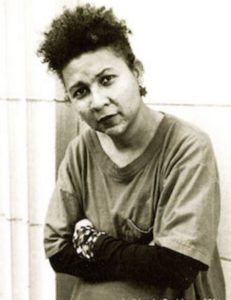bell hooks (*1952) is the pen name used by the American public intellectual, author and activist Gloria Jean Watkins. Her work covers a range of issues and genres including, but not limited to; gender, race/racism, class, sexual politics, spirituality, love, education and pedagogy, cultural criticism, poetry, and children’s fiction. To some, the breadth of this work is testament to bell hook’s insistence on writing for and engaging with a range of audiences. For critics, this pursuit of accessibility results in bell hooks’ scholarly writing lacking academic rigour. A counter to this criticism might be that rather than lacking rigour, bell hooks is acutely aware that language is a site of struggle and opts not to conform to normative markers of academic rigour because they reinforce hierarchies. This is reflected in her insistence on spelling her name lower case, in subversion of current grammar rules.
Two themes stand out across this diverse body of work 1) the insistence that feminism has the potential to better the lives of all people not just those gendered as women 2) a commitment to finding ways to collectively address oppressive structures that result in dehumanisation and environmental injustice. More specifically, bell hooks has consistently shown how feminism as a lens and social movement exposes oppressive structures that are interlinked and sustain themselves via a system of ‘imperialist-white supremacist-capitalist-patriarchy’.
The phrase ‘imperialist-white supremacist-capitalist-patriarchy’ might appear clunky and somewhat of a mouthful, but it is indicative of bell hooks’ conceptual and theoretical position: a position that is sensitive to the relational character of structures influencing the social order, while also seeking to locate these structures within a global and historical context. This reference to location leads us to one of bell hooks most influential contributions to social theory which is the call to examine marginality as a site of resistance. Rather than a place of despair and deprivation, bell hooks contends that margins have the potential to be locations that offer radical possibilities to create counter hegemonic ways of knowing and being.
Key Readings:
hooks, bell (1981). ain’t i a woman: black women and feminism. First Edition. South End Press.
hooks, bell (1990). Yearning: race, gender, and cultural politics. First Edition. South End Press.
hooks, bell (1994). Teaching to transgress: education as the practice of freedom. New York and London. Routledge.
hooks, bell (2000). Feminism Is for Everybody: Passionate Politics. First Edition. South End Press.
Further Resources:
bell hooks on Speaking Freely
bell hooks and John A. Powell on Belonging Through Connection
bell hooks on Feminist Transgression and Resistance
bell hooks on Defining Feminist Liberation
bell hooks and Beverly Guy-Sheftall on This ain’t no pussy shit
Questions:
Why did bell hooks call for people to recognise her as a woman?
Why does bell hooks argue that feminism is for everyone?
Why does bell hooks believe it is possible to alter oppressive structural conditions from the margins? Do you agree?
Submitted by James Esson
